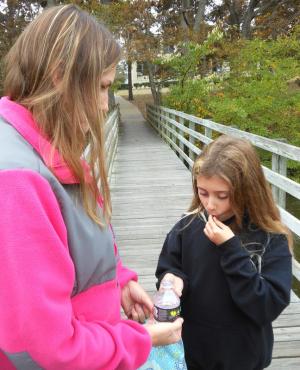School's out for Rylie's Law
In June, legislation was passed allowing 9-year-old Rylie Maedler to use marijuana-based oils to alleviate her brain seizures. But her mother, Janie, said she knew even then the work was not yet finished.
The next step, she said, is for Rylie to be allowed to take her medicine while she's in school.
The first step was the passage of Rylie’s Law, which allows Delaware children under the age of 18 to use medical marijuana-based oils to treat intractable epilepsy and dystonia.
In 2013, Rylie was diagnosed with a benign bone tumor in her face. Surgery removed most of the tumor, but afterwards Rylie began suffering seizures.
The bill was introduced in May by Sen. Ernie Lopez, R-Lewes, and did not attract a single dissenting vote as it made its way through the legislative process.
Medical marijuana was legalized for adults in Delaware in 2011, during the 146th General Assembly. The state’s first dispensary, First State Compassion Center in Wilmington, opened June 26.
However federal and state regulations ban drugs, including marijuana, on school property, meaning, every day since school began, Rylie has been signed out by a parent, walked off school grounds, given her medicine, walked back into school and signed back in.
“We knew it was something that just couldn’t be put into the law,” Janie said. “It’s not the school’s fault at all. The school has been very understanding about it.”
Lopez said everybody involved with Rylie’s Law went into the process clear-eyed and open-minded. He said the goal last session was to get the oils legal in Delaware and then move on from there.
“There’s still a need,” he said.
Lopez said he has begun circulating a draft bill he plans to introduce in February. “A bill like this takes time to craft,” he said. “It’s a definite goal for the 2016 session.”
Lopez is not yet prepared to share the legislation, but, he said, examples of carry-in/carry-out legislation in Maine and New Jersey were good places to start. The specifics are a slightly different in each state, but in general, both states allow a parent to administer a nonsmokable form of medical marijuana on school grounds without fear of police action.
Maine passed the law earlier this year, while New Jersey law is waiting for a signature from Gov. Chris Christie.
Lopez said his bill will be specific to Delaware, but these examples are a good path to follow.
Kelly Bachman, press secretary for Gov. Jack Markell, said the governor was proud to sign Rylie’s Law in June and looks forward to working with Lopez on the issue.
Lopez has not spoken to the governor about this issue, but Bachman wrote in an email that Markell "looks forward to reviewing his proposed legislation and hearing more from the senator if it is introduced.”
Lopez said he’s also looking forward to working with the Cape Henlopen School District. The schools have an important role in the process, he said.
“I don’t want them thinking this is something that’s going to be ramrodded through in Legislative Hall in Dover,” he said.
In the meantime, Janie tries to remain positive. She said she hoped a fix to the school situation would have come sooner, but, she said, she also understands Rylie happens to be the first student in the school district going through the process.
“We’re trail blazing,” she said laughing.
Chris Flood has been working for the Cape Gazette since early 2014. He currently covers Rehoboth Beach and Henlopen Acres, but has also covered Dewey Beach and the state government. He covers environmental stories, business stories and random stories on subjects he finds interesting, and he also writes a column called Choppin’ Wood that runs every other week. He’s a graduate of the University of Maine and the Landing School of Boat Building & Design.






















































